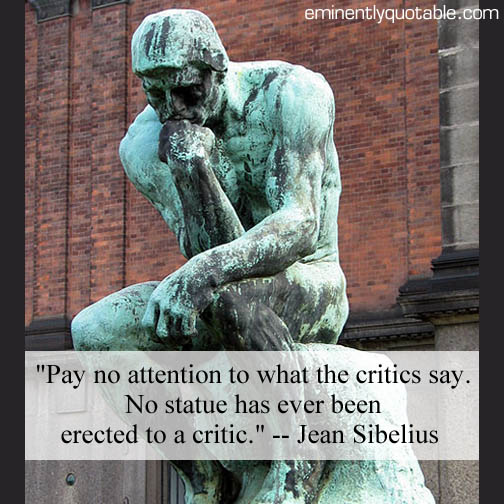
graphic © eminentlyquotable.com | photo – Wikipedia – lic. under CC BY-SA 3.0
“Pay no attention to what the critics say. No statue has ever been erected to a critic.” – Jean Sibelius
Jean Sibelius (1865 – 1957) was a Finnish composer known for his significant contribution to the Finnish national identity through his original compositions. Since 2011, his birthday (Dec.8) became a Finnish celebration called “Flag Day”, also known as “Day of Finnish Music.”
Artists like Sibelius are very much prone to people’s criticisms. Studies have shown that criticisms mess with people’s self-esteem and productivity. The brain tends to overthink about them, thus making it harder to concentrate on important tasks. Negative remarks have also been the reasons for several artists to get discouraged and ultimately quit art.
Criticisms are processed in the amygdala where the fight or flight response are triggered. This explains why negative remarks exude fear and discouragement. To make things worse, they linger in the brain so much more than positive remarks.
Instead of seeing criticisms as personal attacks, psychologists advised that the self should be separated from the work. Also, open-ended questions would help the artist learn more from the criticisms by asking “What do you propose I should change?” Lastly, mistakes and criticisms should be viewed as a part of life especially for an artist. These positive approaches to criticisms will help the person to learn from it instead of becoming hard and bitter.
Much can be said on how a person handles criticisms. Motivational books have preached against going defensive, or the opposite, turning into a chronic people-pleaser. As artist and philosopher Elbert Hubbart said, “The final proof of greatness lies in being able to endure criticism without resentment.”
😳 What Tinnitus Does To Your Brain Cells (And How To Stop It)
After 47 years of studies and countless brain scans done on more than 2,400 tinnitus patients, scientists at the MIT Institute found that in a shocking 96% of cases, tinnitus was actually shrinking their brain cells.
As it turns out, tinnitus and brain health are strongly linked.
Even more interesting: The reason why top army officials are not deaf after decades of hearing machine guns, bombs going off and helicopter noises…
Is because they are using something called "the wire method", a simple protocol inspired by a classified surgery on deaf people from the 1950s...
★ How To Get Rid Of Nail Fungus:
★ Does Your Salad Contain This Vegetable?
★ Top 10 Most Valuable Medicinal Herbs:





